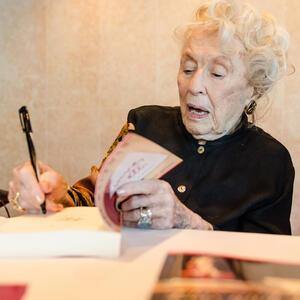Do Not Show This to Bel Kaufman
After Bel Kaufman, writer and public school teacher, published Up the Down Staircase in 1965, one assistant principal at a school where she had taught began adding a warning to his memos: “DO NOT SHOW THIS TO BEL KAUFMAN.” The disclaimer is a testament to what a nerve Kaufman hit with her novel, which followed a young teacher through her first year in an urban public school and highlighted the insane bureaucracy that got in the way of actual teaching. Rather than using a traditional narrative structure, Up the Down Staircase was a fictional collection of letters, memos, student papers, and lesson plans. These included the memo which begins “Please disregard the following,” “Polio consent slips,” and one student’s thesis, “We study myths like Orpheum & his girl friend because it takes place in the Greek Underground.” By turns funny and painful, the book honestly explored the barrage of problems students faced (and continue to face): poverty, drug addiction, teen pregnancy, and racial discrimination. In her New York Times review, Beverly Grunwald praised Bel Kaufman for “breaking down statistics into actual teenagers.” The book spent fifteen months on the bestseller list.
Belle Kaufman was the granddaughter of the Yiddish writer Sholom Aleichem, famed for the Tevye the Dairyman stories that formed the basis for Fiddler on the Roof, and the daughter of Lyalya Kaufman, who wrote stories for the Forward, the Yiddish-language newspaper. Born in Russia, Kaufman immigrated with her family at age twelve and was promptly demoted to first grade because of her poor English. Despite this humiliation, Kaufman was encouraged by her teacher, who helped her rise through the ranks—by age 23, she graduated Phi Beta Kappa from Hunter College, determined to become a teacher herself. Again, her Russian background created a roadblock: she repeatedly failed the teacher’s examination because of her Russian accent. When she finally passed the exam, she began a fifteen-year career teaching English in the challenging environment of New York’s public schools. At the same time she embarked on a literary career, shortening her name to Bel so she could sell her short stories to the male magazine Esquire. Her 1962 essay “From a Teacher’s Wastebasket,” published in the Saturday Review of Literature, led to a book deal for an expanded version. Despite the phenomenal success of Up the Down Staircase and its adaptation into a movie, Kaufman only wrote one other book, Love, Etc., which debuted to mixed reviews in 1979. Her teaching career, on the other hand, continued throughout her long life—at 100 she was still teaching courses on Jewish humor at Hunter College.
With news of Kaufman’s death on July 25, I’m left thinking about her legacy. What gave her writing such power was her insightful and engaging portrayal of a complex problem. Up the Down Staircase isn’t simply a farce about fatuous administrators or inexperienced teachers; it shows the painful array of challenges students face outside the classroom that inevitably bleed into their lives at school. Perhaps part of the reason we are still fighting these battles over failing public education fifty years later is that politicians and reformers tend to look for simple, agreeable, sweeping solutions, but the problems facing public schools—and their students—are far more complex than that. Perhaps Up the Down Staircase should be required summer reading—not for students, but for teachers, administrators, parents, politicians, and all involved in the struggle for better education. But regardless, in capturing this complexity, Bel Kaufman didn’t just make a soapbox speech or crank out a darkly humorous satire; she created a profound work of literature that is every bit as relevant today as it was fifty years ago.
Bel Kaufman spoke at the 2013 JWA Luncheon on the freedom of old age and the impact of Up the Down Staircase. You can watch a video of her speech here or click below:








It is too bad that so many of us had unhappy memories of our high school days, which includes disinterested teachers, various problems and different issues. Moreover, many of those same issues continue to plague schools, students and teachers..
I re-read Up The Down Staircase earlier this summer, after 10 years of teaching in NYC public high schools, and it still rings true. Struggling for better education is indeed complex, which is probably why it is politically untenable, and don't-call-it-a-silver-bullet silver bullet type solutions get imposed instead.